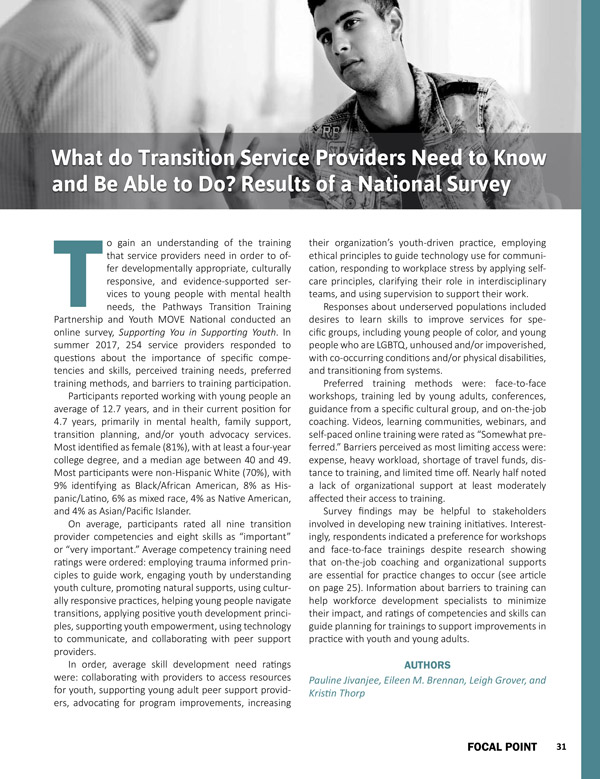
Abstract: This project summary describes the results of an online survey conducted by Pathways Transition Training Partnership and Youth MOVE National (YMN) to gain understanding of the training needs of service providers who work with young people with mental health needs.
"What do Transition Service Providers Need to Know and Be Able to Do? Results of a National Survey" (2018)
By Pauline Jivanjee, Eileen M. Brennan, Leigh Grover, & Kristin Thorp
To gain an understanding of the training that service providers need in order to offer developmentally appropriate, culturally responsive, and evidence-supported services to young people with mental health needs, the Pathways Transition Training Partnership and Youth MOVE National conducted an online survey, Supporting You in Supporting Youth. In summer 2017, 254 service providers responded to questions about the importance of specific competencies and skills, perceived training needs, preferred training methods, and barriers to training participation.
Participants reported working with young people an average of 12.7 years, and in their current position for 4.7 years, primarily in mental health, family support, transition planning, and/or youth advocacy services. Most identified as female (81%), with at least a four-year college degree, and a median age between 40 and 49. Most participants were non-Hispanic White (70%), with 9% identifying as Black/African American, 8% as Hispanic/Latino, 6% as mixed race, 4% as Native American, and 4% as Asian/Pacific Islander.
On average, participants rated all nine transition provider competencies and eight skills as “important” or “very important.” Average competency training need ratings were ordered: employing trauma informed principles to guide work, engaging youth by understanding youth culture, promoting natural supports, using culturally responsive practices, helping young people navigate transitions, applying positive youth development principles, supporting youth empowerment, using technology to communicate, and collaborating with peer support providers.
In order, average skill development need ratings were: collaborating with providers to access resources for youth, supporting young adult peer support providers, advocating for program improvements, increasing their organization’s youth-driven practice, employing ethical principles to guide technology use for communication, responding to workplace stress by applying self-care principles, clarifying their role in interdisciplinary teams, and using supervision to support their work.
Responses about underserved populations included desires to learn skills to improve services for specific groups, including young people of color, and young people who are LGBTQ, unhoused and/or impoverished, with co-occurring conditions and/or physical disabilities, and transitioning from systems.
Preferred training methods were: face-to-face workshops, training led by young adults, conferences, guidance from a specific cultural group, and on-the-job coaching. Videos, learning communities, webinars, and self-paced online training were rated as “Somewhat preferred.” Barriers perceived as most limiting access were: expense, heavy workload, shortage of travel funds, distance to training, and limited time off. Nearly half noted a lack of organizational support at least moderately affected their access to training.
Survey findings may be helpful to stakeholders involved in developing new training initiatives. Interestingly, respondents indicated a preference for workshops and face-to-face trainings despite research showing that on-the-job coaching and organizational supports are essential for practice changes to occur. Information about barriers to training can help workforce development specialists to minimize their impact, and ratings of competencies and skills can guide planning for trainings to support improvements in practice with youth and young adults.
Suggested Citation
Jivanjee, P., Brennan, E.M., Grover, L., & Thorp, K. (2018). What do Transition Service Providers Need to Know and Be Able to Do? Results of a National Survey. Focal Point: Youth, Young Adults, and Mental Health, 32, 31. Portland, OR: Research and Training Center for Pathways to Positive Futures, Portland State University.